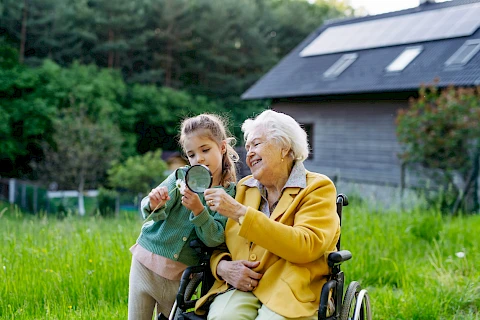
Our senior loved ones often experience changes in their eyesight. Vision loss can represent a challenge, particularly for seniors who may struggle to adapt. Knowing how to support our family members through these changes is crucial as caregivers. Senior Helpers shares the emotional impact of vision loss on older adults, how we can help them adapt, and other helpful information for assisting seniors living with vision loss.
What is the Emotional Impact of Vision Loss?
Vision loss can be emotionally overwhelming for seniors. They may feel sadness, frustration, or even depression. Losing the ability to see clearly can make anyone feel isolated and helpless.
Empathy and active listening are vital to supporting your loved one emotionally. Validate your senior's feelings and provide a safe space for them to express their thoughts. Strategies for emotional support include:
- Encouraging them to talk about their feelings
- Helping them stay connected with friends and family
- Offering extra patience and reassurance
Adapting to Vision Changes
Making the necessary adjustments to our senior loved ones’ homes means making their living space safer and more accessible. Home modifications for safety and accessibility include:
- Removing tripping hazards
- Using contrasting colors to highlight edges
- Installing adequate lighting, especially on pathways and using task lighting for designated areas
Daily living aids and technologies such as large-print books, talking clocks, and screen readers also help tremendously. It's vital to encourage independence while assisting. Help your loved one maintain their independence by enabling them to perform tasks with adaptive tools while being there to assist when needed.
Low-Vision Aids and Resources
Low-vision aids can dramatically improve the quality of life for seniors. Various types of low-vision aids are available, including magnifiers, screen readers, and audiobooks. To choose the right aids, consult an eye care specialist to determine the most suitable options based on individual needs.
Support Groups and Rehabilitation Services
Joining support groups and utilizing vision rehabilitation services can be immensely beneficial for seniors and their caregivers. These groups offer emotional support, shared experiences, and practical advice from others going through similar challenges. Vision rehabilitation services help seniors adapt by providing training on using low-vision aids and strategies for navigating daily activities. To find local support, check with local senior centers or healthcare providers for information about support groups and rehabilitation services available in your area.
Why You Need Patience and Understanding
Supporting a loved one with vision loss requires patience and understanding. Building a supportive environment is crucial for their well-being. Create a safe and easy-to-navigate home atmosphere. Use clear communication and offer consistent emotional support. To maintain patience and reduce frustration, take breaks, stay positive, and celebrate small victories together. Encourage open communication by ensuring your loved one feels comfortable sharing their needs and concerns.
We're Here to Help
Vision loss in seniors can be difficult, but our elderly loved ones can still lead fulfilling lives with the proper support. Empathy, understanding, and the right resources will make all the difference.
If you reside in Waxhaw, Monroe, Concord, Kannapolis, or Salisbury and seek support for your senior loved one, we encourage you to contact us at Senior Helpers Waxhaw-Monroe. We would love to discuss our services for seniors and their caregivers, such as Personal Care and Chronic Disease Care.